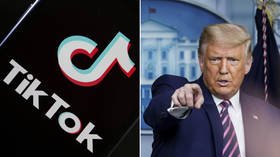We’re no longer in the century of humiliation! Why China will not cave in to Trump’s state extortion over TikTok

The battle over TikTok is all because the US finds the idea of a Chinese social media app gaining global acclaim as intolerable and a threat to its own monopolies in Silicon Valley.
Did I miss the announcement that The Apprentice has got a new episode out? You know, the one where Donald Trump shouts “You’re fired!” to TikTok’s owners in Beijing? Oh, wait, that’s not a reality TV show – it is reality. At least in his mind.
Were it not so serious, you would have to laugh at this week’s flip-flopping antics of the former TV show host turned president of the USA.
On Sunday, he stated he was giving his “blessing” to a deal between US giants Oracle and Walmart and ByteDance, TikTok’s Chinese owner. ‘TikTok-Oracle Deal Wins Trump’s Approval,’ read the headline on Bloomberg.
Also on rt.com Colonialism 2.0: US assault on TikTok is latest step in building monopoly on hearts & minds of internet-connected worldBy Monday, he had made a U-turn, demanding that the Chinese firm cede control of its US operations completely, or he would ban the popular platform. ‘Trump Says ByteDance Can’t Keep Control of TikTok in Oracle Deal,’ said Bloomberg.
Initially, the deal reported by the media involved the two US companies taking a 20 percent stake in the creation of a new venture, TikTok Global, which would see its data managed by the American stakeholders. But now the White House has seemingly reverted to its old position of demanding that ByteDance, or as it puts it, “China,” cedes “complete control” of the application in the US, including the handover of its technology and algorithm. Under the headline ‘Say ‘No!’ to US robbery of Tik Tok,’ China’s Global Times stated the country will “not accept an unequal treaty that targets Chinese companies.”
Trump’s actions concerning this app, irrespective of the eventual outcome, should be understood not as legitimate “national security concerns,” but a clear attempt to subjugate and humiliate China for his own political and electoral gain, as well as to maintain American primacy over technology and global social media.
His approach has been infused with his classical ‘Art of the Deal’ approach so beloved of fans of The Apprentice. It essentially involves pushing a given target to the brink in an attempt to extort an outcome on terms favorable to him. Beijing, however, sees painful historical parallels in Trump’s conduct, and is prepared to rise to the challenge.
Also on rt.com Banning TikTok gives Trump cheap anti-China points but undermines his free speech chops in war with Twitter and GoogleThere is a period in China’s history, roughly dating from 1830 to the 1950s, which is popularly referred to as the “century of humiliation.” It describes an era when the country was subjugated to political and economic exploitation by Western powers and forced to accept agreements on unequal terms, particularly by Britain, France, Germany and Japan, amongst others.
The era is commonly defined to have begun with the commencement of the opium wars, whereby the British Empire waged war against the Qing Dynasty in order to open up its markets by force to export opium, resulting in the Treaty of Nanking, which forced China to accept British demands and the subsequent annexation of Hong Kong.
The legacy of the century of humiliation has a deep influence on how China perceives its relations with the rest of the world today, particularly the West. To Beijing, the Trump administration has sought to forcefully confront and contain China on multiple fronts, especially in the field of technology and trade, in ways reminiscent of the bad old days.
The US evidently does not accept China on equal terms, and once having believed trade and engagement would “reform” the country towards America’s image and preferences, the impetus has now shifted to Washington attempting to stifle the country’s rise and force changes to its political-economic system.
This is where TikTok comes into the picture. The claim that the popular video application is a threat to US national security should not be taken seriously – it’s a platform used by young people to post videos, mostly of them doing silly dances.
Washington has a way of whipping up fear and hysteria in order to manufacture consent for its aggressive foreign policies. There is no serious evidence TikTok has engaged in any wrongdoing. Instead the impetus is geopolitical: the US finds the idea of a Chinese social media application gaining global acclaim as intolerable and a threat to its own monopolies in Silicon Valley. The Trump administration’s response to any Chinese initiative which challenges or outgrows US capabilities is simply to attempt to crush it by coercive force.
Also on rt.com The new media elite will stop at nothing to protect their profits. They’re rapacious monopolists, and we are their foodIn this case, however, an outright ban on an application as popular as TikTok (it has around 80 million users in the US) would be politically damaging for Trump. Which is why he has sought to utilize state force with the view to extorting the app into American ownership. The fact that the proposed venture is called TikTok Global is an obvious indicator that the new “US” version of the platform would quickly aim to compete with and make obsolete ByteDance’s market in the rest of the world.
Little wonder then that, in line with the rest of the administration’s policies, China perceives the attempt by Trump to extort TikTok as an attempt to start a new century of humiliation. Their judgement is correct. Once again, a Western power believes that China ought only to exist on terms which are tolerable to the West, and that the way to “handle” the country involves attempting to subjugate it into accepting unequal agreements.
But this is 2020, not 1920. China will no longer be treated in this way or approve any deal which extorts ByteDance’s business. Beijing would rather see TikTok banned in America than have it stolen from them through Trumpian coercion.
Like this story? Share it with a friend!
The statements, views and opinions expressed in this column are solely those of the author and do not necessarily represent those of RT.














